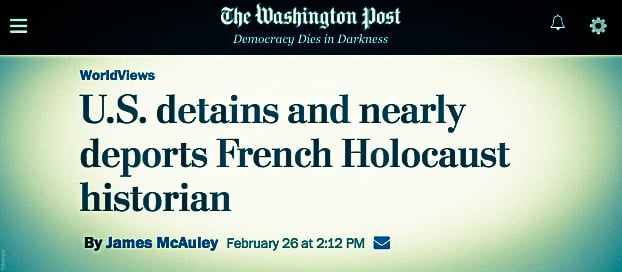Henry Rousso, a Jewish Holocaust historian and Egyptian-born French citizen, was detained by U.S. officials for ten hours after his eleven hour flight from France and was about to be returned to Paris before faculty at Texas A&M University, where he was scheduled to speak, intervened.
According to the Washington Post:
“. . . he called me with this news two nights ago, he was waiting for customs officials to send him back to Paris as an illegal alien on the first flight out,” [according to Richard Golsan, director of the Glasscock Center for Humanities Research at Texas A&M].
The university then sprang into action . . . with President Michael Young reaching out to law professor Fatma Marouf, who earlier this month had assisted in writing an amicus brief against President Trump’s executive order banning refugees from around the world and travelers from seven Muslim-majority nations.
Marouf quickly and successfully intervened with immigration authorities, and Rousso was released and allowed to deliver his lecture.
Rousso shared his thoughts on twitter Saturday:
Thank you so much for your reactions. My situation was nothing compared to some of the people I saw who couldn’t be defended as I was.
— Henry Rousso (@Henry_Rousso) February 26, 2017
On Sunday Rousso wrote about his experience, and those of strangers detained with him, closing with:
“A professional historian, I am wary of hasty interpretations. This incident caused me some discomfort, difficult to deny. However, I cannot help but think of all those who suffer these humiliations and legal violence without the protections I have been able to enjoy . . . That is the situation today. It is now necessary to deal with the utmost arbitrariness and incompetence on the other side of the Atlantic. I do not know what is the worst. What I know, having loved this country forever, is that the United States is no longer quite the United States. ”
Other Occurrences
In another situation last week, Muhammad Ali Jr., an American born in Philadelphia and son of the famed boxer, was detained for two hours after a domestic flight and asked questions about his name, his religion (“Are you Muslim?”), and his place of origin.
These types of occurrences have been happening to others who do not have the relational/professional connections and fame that enables them to challenge these situations, and their stories do not make the national headlines. Hearing news of these events, I have Muslim friends, friends of Middle Eastern descent (both Christians and Muslims), and Hispanic friends—all American citizens—who are now preparing mentally and emotionally to be questioned when they have to fly, even domestically.
The Question
As policies are beginning to be put into place and enforced under the current rhetoric of fear, safety, and implied nationalist homogeneity, it seems that we are running the risk of becoming a nation defined more by exclusion than inclusion, where even citizens and friends are held suspect. I’ve visited nations where this sort of policing takes place. They are not systems that I would wish to live under.
So, I have to ask: is this making America great?
